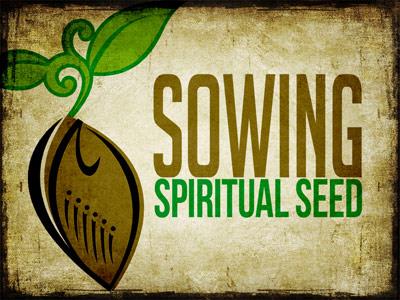-
Cracking The Hard Seedcoat Series
Contributed by W Pat Cunningham on Nov 28, 2017 (message contributor)
Summary: The hard surface of our hearts must be scarified or we cannot grow and we cannot bear fruit.
Wednesday of Holy Week 2013
Seeds 3
[Preacher: You should have a bluebonnet seed or other seed and either sandpaper or vinegar.] We come to what we might call the last day of the triduum before the Great Triduum, and to the moment Church tradition calls “Spy Wednesday.” This is the day the imagination of the Church assigns to the betrayal of Judas. The Gospel of Matthew recounts the great sin, certainly the greatest sin one could imagine of anyone who has been intimately associated with Jesus for three years of healing and preaching and even raising the dead. Judas bargains over Jesus as if He were an item offered at a bazaar. And the thirty silver pieces, like everything else we see this week, were foreseen hundreds of years earlier by the prophet Zechariah.
But Judas is not in control this week; the Pharisees are not in control either. Not even Pilate is the grand stage manager of this Divine Comedy. No, Jesus is the Master even as He manages the action as He fulfills the Father’s will that He suffer and die for humankind. He has said “the grain of wheat, if it does not die, remains alone. But if it die it can bear much fruit.” His mission is to save us from our sins–Peter, James, John, even Caiaphas and Mary, who was preserved from all sin in view of this very week. His mission is to destroy eternal death in man–for Nathaniel, Thomas, Mary Magdalen, and even Judas the Iscariot, who would reject redemption and hang himself in despair.
Jesus was a carpenter, but he may have watched Mary and helped her in the family garden from an early age. So he understood seed. [Hold up seed.] This is a bluebonnet seed. If it falls into the ground, it won’t sprout immediately. It has a hard seedcoat. A very hard seedcoat. That almost impenetrable layer keeps water out. It also keeps the tiny drop of water and DNA in, and is useful in drought years to keep it from sprouting and dying. But if it doesn’t sprout, it can’t bear fruit–more bluebonnet seeds.
So the wise gardener scarifies the seed. That means he does something to make the seedcoat permeable to water. He does that because he intends to water it and help it sprout. How do you do that? You can either use sandpaper or concentrated vinegar–acid. That either wears off or dissolves the seedcoat so that water can get in, and the plant can get out.
Human nature has a hard heart. All of us have hard hearts. The great Ronald Knox once counseled that the greatest tragedy is not a broken heart, it is rather a hard heart. A hard heart cannot give. It cannot love. Maybe it has been hurt often, and has grown the hard shell as a defense mechanism. No matter what, hard hearts cannot do good, nor can they receive the grace of God that is needed for them to grow and to do good. To use another analogy, the shellfish cannot grow until it sheds its hard exoskeleton.
God, in his infinite goodness, will scarify our hearts. And–pardon the pun–that is a scary prospect. We hardened our hearts to keep from being hurt. When God takes his sandpaper or acid or emory board to our hearts, it hurts them. But it’s the only way for grace to get through. That is, if I may be bold, why the author of Hebrews teaches that Christ was made perfect through suffering. In His human nature, Jesus was scarified by his experiences. In his first three decades, he saw death all around him. He saw the persecution of Jews by the Romans. He saw at least one revolt of Jews against the Romans, and at least heard about the hundreds of Jews who were crucified and died over a period of several days after that revolt. He was probably forced to do work for the Romans, and he also saw the hatred engendered by those Jews who got rich as Roman tax collectors. But these experiences did not harden the heart of the God-man. He saw how weak and stupid we are, how our wounds are mostly self-inflicted. His mother and Joseph helped Him to grow in understanding and wisdom and forgiveness.
When we experience scarification, which is a divine gift, we are in pain. We suffer some financial setback, some illness or injury, or some pain from one we love, and we want to shake our fists at God. We want to close up and become hard. But the grace of God inspires us to open our hands and lift our voices instead in praise. Then the acid and sandpaper of difficult times makes us more like Jesus. Then we can grow and bear fruit. May God grant this as a grace of this Holy Week.

 Sermon Central
Sermon Central



